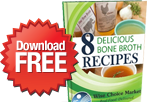- Home
- probiotic rich foods
Blog Categories
Recent Posts
7 Probiotic-rich Foods to Maximize Your Morning Workout
Posted by on
I admit it. I’m a bit of a workout junky. I like sweating, feeling relaxed, and all those good endorphins that flood my bloodstream after I work out. On a good day, I get up early in the morning, have some green tea and write or edit any articles I need to turn in that day. And even if I'm feeling sluggish, I get in my workout routine.
Everyone’s workout routine is different. For years, I didn’t pay attention to the impact of diet on mine. The role of probiotics and a healthy diet wasn’t clear to me. After all, I used to go to the gym religiously 3 times a week, whether I wanted to or not. My morning workout plan included at least a half hour of cardio, weight lifting, and some stretching at the end. Sometimes I mixed the cardio up by running around the indoor track in the winter. I got in shape and felt good for a while, but then I got bored with following the same workout plan every day and hit a plateau.
That's when I asked my personal trainer Shelly, who runs marathons and teaches yoga, cycling, and Pilates, about my boredom and plateau. I wasn’t losing weight, and my workout routine was a little too repetitive. Shelly said to mix it up and add variety to my workouts. Like most lifestyle changes, it took me a while to really grasp what she meant.
Following her advice, I now work out at least 6 days a week and run outside a couple days a week. Going to local county parks and running or hiking gives me the variety I need and the workout routine changes that my body needs. It’s easy to skip the gym in the warmer months, but I still need to do exercises to stay flexible and limber, as well as strengthen my body.
I changed my workout plan slowly and now also swim a couple of times each week, doing laps in an Olympic length pool. On a good day, I do over a half mile of the crawl, backstroke and flutter kicking with a kick board. The low impact workout relaxes my body and uses different muscle groups than my other workouts, also taking some of the tension out of my neck, shoulders, and hips. But a change in my workout routine wasn't the only thing I needed…it was only a part of the process. Probiotic rich food were a big part of my eventual weight loss success.
Probiotic Rich Foods
Recently, I’ve added kefir for breakfast, using it in place of almond, soy, or rice milk with oatmeal and fresh fruit. If you add kefir to your daily breakfast, make sure to eat before you workout – usually at least an hour before going to the gym. Kefir helps you to digest your food easier, and gives you a boost of healthy, gut-healing probiotics. If you don’t like kefir, try one of the other probiotic rich foods listed below.
Yogurt
Look for brands made from goats’ milk that have lactobacillus or acidophilus and that say “live and active cultures.” Better yet, grow your own yogurt at home. The good bacteria in live yogurt keep the digestive tract clean and the nutrient rich yogurt can help to feed the good bacteria already present in your gut. Remember that many store bought yogurts don’t include live and active cultures, and when they do, they may be extremely limited in quantity. I’m a big advocate of homegrown yogurt, but if you choose to purchase, do your research first. The label doesn’t say everything.
Kefir
This is my favorite probiotic thus far. Similar to yogurt, kefir is a fermented dairy product made of cow, goat, or sheep’s milk and kefir grains. It’s very satisfying. The probiotics in kefir help to colonize the gut and cultivate a more diverse range of bacteria then yogurt. Try a small amount with granola and fresh fruit in the morning.
Smoothie
Many athletes in training have a smoothie after they workout. Different combinations of fresh fruit – strawberries, blueberries, raspberries, mango, banana – you name it, and vegetables like spinach or algae, along with kefir or yogurt. Some smoothies provide a boost of energy after a workout, others a mental boost that we all need. Don’t add any excess sweeteners (you don’t need them), and keep in mind that it’s easy to overindulge when you drink smoothies.
A protein boost like what you get from kefir, yogurt, or a smoothie, is one of the best meals to down after a workout. Milk products can help cut fat, build muscle, and improve muscle recovery when you have them after your workout.
Kombucha
A fermented tea that comes in a variety of flavors – ginger, peach, raspberry, apple, and many more, kombucha also comes with healthy gut bacteria that may help you lose weight and increase your energy. Kombucha is a form of fermented tea 1 that contains a high amount of healthy gut bacteria. This probiotic drink has been used for centuries and is believed to help increase your energy, enhance your well-being. Just remember that kombucha tea may not be the best fit for everyone, especially those who have had problems with candida.
Kimchi
An Asian form of pickled sauerkraut, kimchi is an extremely spicy and sour fermented cabbage, typically served alongside meals in Korea. Besides beneficial bacteria, Kimchi is also a great source of beta-carotene, calcium 2, iron, and vitamins A, C, B1, and B2. Kimchi is one of the best probiotic foods you can add to your diet 3, assuming you can handle the spice, of course. According to an article on BodyBuilding.com, kimchi is a great workout buddy because it helps burn fat, absorb nutrients, and control blood sugar. Not bad for a little spicy cabbage!
Miso Soup
Made from fermented beans (usually soy), rice, barley, or rye, a tablespoon of miso added to a cup of hot water makes a quick soup that is full of lactobacilli and bifidus bacteria. One of the cornerstones of traditional Japanese medicine, miso is nutrient dense, filling and quite satisfying. It’s not Paleo, so if that’s your lifestyle, skip this one. Otherwise, enjoy. Miso is a popular detox food, so if you’re ready for a cleanse, consider it a great nutritional companion for your workout!
Micro-algae
This group of salt water plants include blue-green algae, spirulina and chorella. They help increase the amount of healthy bacteria like lactobacillus and bifidus bacteria in the gut. Micro-algae are added to yogurt, smoothies, and myriad of other foods 4 since they provide a huge boost of energy. Try adding a little micro-algae to your pre-workout meal to help you workout a little longer and a little harder.
Your Gut Microbiome
Most of us are aware that the bacteria in our gut play an important role in digestion. When the stomach and small intestine are unable to digest certain foods we eat, gut microbes jump in to offer a helping hand, ensuring we get the nutrients we need.
Gut bacteria are known to aid in the production of certain vitamins5, including vitamins B and K, and play a major role in immune function 6. The benefits of a healthy gut microbiome are significant, and not limited to your workout. We’ve covered your gut microbiome in a few other articles here on the blog, so take a look through the archives for more info on creating and maintaining a healthy gut. Once I started to pay more attention to the probiotic foods in my diet, my workout improved drastically. Ready to lose a little weight and gain a little muscle? Try it for yourself, and let me know how it goes!
References:
1. http://www.globalhealingcenter.com/natural-health/what-is-kombucha-10-facts-need-to-know/
2. http://www.globalhealingcenter.com/natural-health/foods-high-in-calcium/
3. http://rosemarried.com/2012/07/19/kimchi-breakfast-bowl/
4. http://www.globalhealingcenter.com/natural-health/probiotic-foods/
5. http://www.medicalnewstoday.com/articles/195878.php
6. http://www.medicalnewstoday.com/articles/290747.php
Information provided in this communication is not designed to and does not provide medical advice, professional diagnosis, opinion, treatment or services to you or to any other individual. This is general information for educational purposes only. The information provided is not a substitute for medical or professional care, and you should not use the information in place of a visit, call consultation or the advice of your physician or other healthcare provider. Wise Choice Marketing Inc is not liable or responsible for any advice, course of treatment, diagnosis or any other information, services or product you obtain through Wise Choice Marketing Inc.



 Loading... Please wait...
Loading... Please wait...












